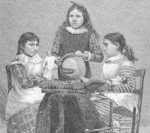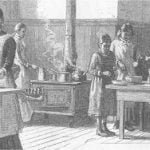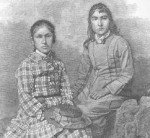
Another teacher was less successful with her moral teaching, in trying to explain a hymn they had learned to recite:
“Yield not to temptation, for yielding is sin;
Each victory will help you some other to win.”
The next day one of the girls came to her, exclaiming, triumphantly, ” I victory! I victory! Louisa Bullhead get mad with me. She big temptation. I fight her. I victory!”
One can but sympathize with. another who was “victory” in a different sort of encounter. A party of excursionists landed on the Normal School grounds in the summer, and hunting up some of the Indian students, surrounded them, and with more regard for their own amusement than for wasting courtesy on “savages,” plied them with such questions as, “What is your name? Are you wild? Can you speak English? Do you live in a house at home?” till even Indian patience was exhausted, and one girl turned upon her inquisitors. When they began, “Are you wild?” she replied, with a look that perhaps confirmed her words,” Yes, very wild; are you wild?” ” Can you speak English?” ” No, I can not speak a word of English.”

They understand much of what is said before them, and are sensitive to allusions to their former condition. Three of the little girls at work in their flower garden, as a visitor passed, came running to their teacher with the indignant complaint, “That gentleman said, `Poor little things!’ We are not very poor little things, are we?”
Talking naturally comes slower than reading or understanding, but improves, with the confidence gained in daily association with English speaking companions and the drill of the class room. They are beginning to think in English, for they speak it sometimes to each other, and the little girls are often heard talking English to their dollies, considering them white babies, perhaps, or having less fear of their criticism. Phonic exercises are found useful. One evening a week is. given to English games, and one to singing, under the instruction of one of the former band of ” Hampton Student” singers. He has succeeded in the difficult task of transcribing several of their own wild love songs, words and notes, and in teaching them to sing simple exercises by note in time and tune, though their first efforts were about as harmonious as a. Chinese orchestra. They have picked up, many of the hymns and plantation melodies sung by their comrades, and are as fond of singing over their work. Monthly records of each one’s standing in study, work, and conduct are sent home to their agencies, and on the back of each card a little English letter from each who is able to frame a few sentences of his own. These cards have had a great effect upon the parents, to whom they are shown by the interpreters, and are a strong incentive to the children.

The mornings only are given to study, and the afternoons to industrial training and exercise, with Saturday as a holiday. The school farm of two hundred acres, and the ” Shellbanks” farm of three hundred and thirty, the latter given chiefly in the Indians’ interest by a lady friend in Boston, afford abundant opportunity for training both races in farming and the care of stock. Both have ample room also in the large brick workshops erected and fitted up by the generosity of Mr. C. P. Huntington, of New York. A sixty-horse-power Corliss engine, given by Mr. G. H. Corliss, supplies the power to these shops, and to a saw-mill, where all the lumber used on the place is sawed. All the bricks used are also made on the place. Some of the Indians work in the saw-mill and engine-room. Besides the farmers, the division of labor for the boys thus far includes blacksmiths, carpenters, wheelwrights, tinsmiths, engineers, shoemakers, harness-makers, tailors, and printers. They are also employed as waiters and janitors. Special effort is made to have each of the agencies from which they come represented by as many different trades as possible. They like to work about as well as most boys, are slow, and need watching, but show a special taste and aptness for mechanics. At present most of the shoes worn by the Indian boys are made entirely by Indian hands. Trunks, chairs, and tables, tin pails, cups, and dust-pans, are turned out by the dozens, and most of the repairing needed on the place is done in the various shops. The carpenters, under direction of a builder, have put up a two-story carriage house twenty-four by fifty feet, weather boarded and shingled. A Cheyenne (St. Augustine) and a Sioux are each proud of a fine blue farm cart made entirely by their own hands. All the shops report improvement. Their instructor in farming, a practical Northern farmer, says ” They don’t like to turn out early in the morning, but otherwise do as well as any class of workmen, and seldom now have to be spoken to for any slackness. It is common to see five or six in a hoeing race, with the end of a beet or corn row for the goal.”A natural, and therefore valuable, stimulus to their energies, and doing much to make men of them, has been the payment of wages. Part of the government appropriation is given to them in this form instead of in clothing. They are expected to buy their own clothing out of it, except their school uniform. There is some waste, but more profit, in the lessons thus taught of the relation of labor to capital.
The military organization of the school, thus far under the charge of Captain Henry Romeyn D, Fifth Infantry, U.S.A., has been an important aid in their discipline, and general setting up of body and spirit. Sergeant Bear’s Heart and Corporal Yellow Bird are as proud of their command, and as careful to maintain the honor of their stripes, as any West-Pointer; and the fleet-footed little “markers” would doubtless fight for their colors, if they would not die for them. Yellow Bird is janitor of the wigwam, and the present teacher in charge reports, “A cleaner school building I never saw.” Saturday is general cleaning day. Only the outside of the platter was civilized at first, but the effect of clean halls was soon apparent. They wanted a clean house all through, and the boys went voluntarily down on their knees and scrubbed their own rooms.

During the summer vacation, from the middle of June to the first of October, the boys who remain at the school alternate farm-work with camp life at “Shellbanks,” sleeping in tents, living outdoors, cooking for themselves, fishing, hunting, and rowing. For two summers a selected number-this year seventeen boys and eight girls-have been scattered among the farmers of Berkshire County, Massachusetts, working for their board, sharing the home life, and improving in health, English, and general tone. They have won a good report from the families which have taken them, even better this year than last, and have done much to increase public sympathy for their race.
The co-education of the sexes is regarded at Hampton as essential to the development of both these races in which woman has been so long degraded. The Indian girls’ improvement has been as marked as the boys’. Their early inuring to labor has its compensation in a better physical condition apparently, and their uplifting may prove the most important factor in the salvation of their race. Besides the class instruction which they share with the boys, the girls are trained in the various household industries-washing, ironing, cooking, the care of their rooms, and to cut and make and mend their own clothes and the boys’. They all have flower gardens, and take great delight in them, and in decorating their rooms. The cooking class, under a teacher who has had charge of the “North End Mission” cooking school in Boston, is a very favorite “branch.” Its daily successes are placed triumphantly upon the table of the class they belong to, and no doubt find the regular road to the hearts of the brave.
A love-letter picked up on the floor of a school with Hampton’s views on co-education need not inevitably shock even pedagogic sensibilities. Written in an unknown tongue, however, with only the names to betray it, a translation by the private interpreter seemed only a proper precaution. If I confide it to the gentle reader, the Indian lovers will be neither the worse nor the wiser, while some others may find in it valuable suggestions for similar correspondence.
“Normal School 1 February 3, 1819.
“Miss ______ _____:
I said I like you, and I want to give you a letter. Whenever I give you letter, I want you answer to me soon. That’s all I want, and I will answer to you soon after. When you give me letter, it raises me up. It makes me heart-glad, sister-in-law. When I talk, I am not saying anything foolish. Always my heart very glad. I want you let me know your thought. I always like you and love you. I am honest about what I say, I always keep in mind. I want always we smile at each other when meet. We live happy always. I think that’s best way, and you think it is and let me know. And I want to say one thing-don’t say anything to Henry. I don’t think that’s right. And I say again, when I give a letter, keep nicely and not show to any one. If they know it, it not good way.
They take us away, and that is the reason don’t show it. Hear me, this all I am going to say. I like you, and I love you. I won’t say any more. My whole heart is shaking hands with you. I kiss you.
Your lover,
